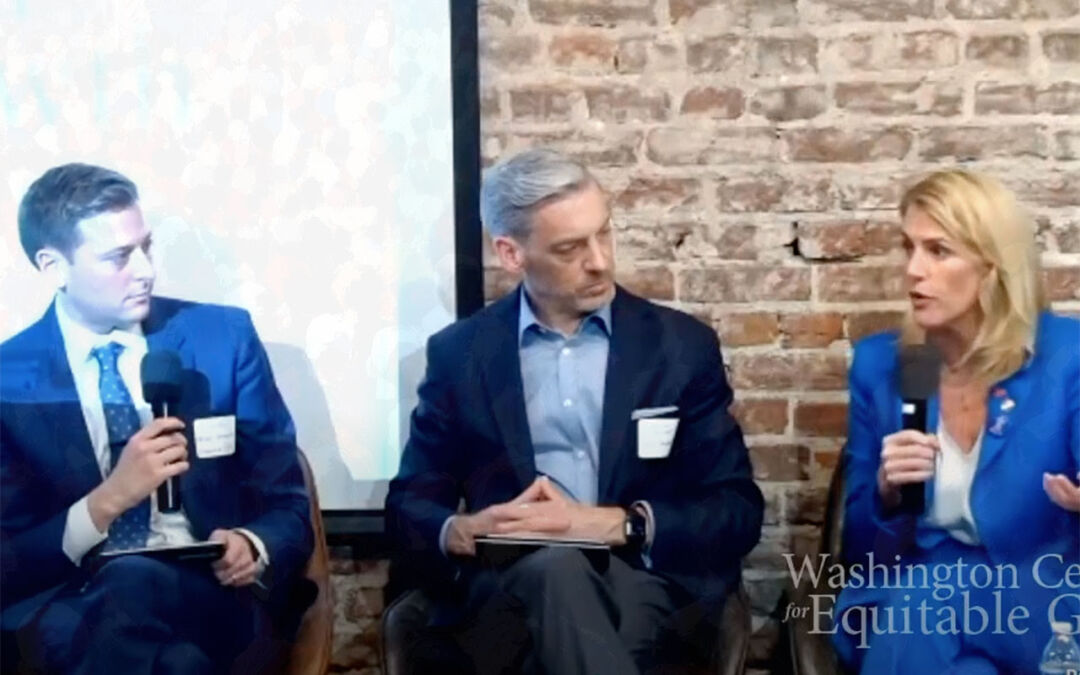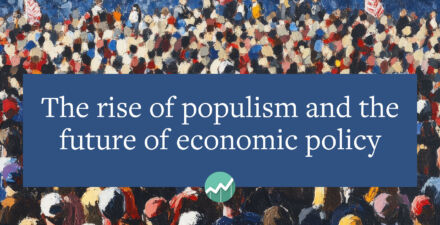Equitable Growth event brings together scholars and the policy community to discuss the rise of right-wing populism and the future of economic policy

This article was drafted with assistance from Perplexity AI.
The Washington Center for Equitable Growth in mid-May hosted an event on “The rise of populism and the future of economic policy,” in Washington, DC. The event featured speakers from the policymaking and advocacy communities, as well as from academia, who have studied the connections between populism and policy both in the United States and abroad. In particular, they discussed what is causing the recent surge in support for right-wing populism and the ways in which policymakers can enact economic and social policies to counter the rise of this anti-democratic movement.
The event opened with a welcome from Equitable Growth Vice President of Impact and Special Initiatives Melissa Grober-Morrow, who highlighted the launch of a new essay series exploring the causes of rising right-wing populism and offering policy solutions to strengthen democracy. Then, Equitable Growth President and CEO Shayna Strom emphasized that dissatisfaction with politics and economic conditions is growing in the United States and other advanced democracies, noting how economic policies in recent decades have often led to rising inequality, stagnant growth, higher costs of living, and declining job quality. This, she continued, has fueled support for right-wing populist parties and politicians, particularly those with authoritarian leanings.
The audience then heard from former U.S. Sen. Sherrod Brown (D-OH), who delivered a keynote address on the dignity of work. Sen. Brown argued that true populism is about lifting up all people, not dividing them, and that economic policy must put workers at the center of policymaking. He described how the U.S. economy has increasingly failed to reward work, especially for those without college degrees, with stagnating wages and rising cost of living prevalent across the country.
Sen. Brown traced much of the current discontent to trade agreements such as North American Free Trade Agreement in the late 20th century and the normalization of trade relations with China at the turn of the 21st century. He recounted how these policies led to job losses, the decline of working-class communities, and a sense of betrayal—especially among workers who felt abandoned by both political parties. He also critiqued decades of economic policy that prioritized financial markets and corporations over workers, leading to diminished job quality, weakened labor protections, and eroded trust in government.
The remarks set the tone for a day of evidence-based discussion on the intersection of economic policy and democracy, which continued with the second keynote address, from Sara Nelson, the international president of the Association of Flight Attendants-CWA. She began by recounting her own journey from aspiring teacher to flight attendant, highlighting how economic pressures and the promise of union-negotiated benefits shaped her career path.
Nelson then traced the decline of union membership in the airline industry and across the U.S. workforce, linking it to policy changes such as deregulation, the weakening of labor protections, and high-profile anti-union actions. She showed how these trends have coincided with rising income inequality and the erosion of hard-won labor standards, including the eight-hour workday and weekends reserved for rest and leisure. She emphasized that the decline in union density has not only reduced workers’ economic security but also undermined their agency and voice in the workplace, contributing to a broader sense of disempowerment and division.
Following Nelson’s remarks, she was joined onstage by Columbia University’s Alexander Hertel-Fernandez and Yale University’s Jacob Hacker. The three of them discussed how anti-union strategies—summed up as the “four Ds,” or divide, delay, distract, and demoralize—have weakened worker power. They noted that tactics such as stoking racism, sexism, and political divisions have been used to pit workers against each other and undermine collective action.
The conversation then touched upon the failures of recent economic policies, which have prioritized corporate profits and tax cuts for the wealthy over workers’ well-being. The panel critiqued the narrative that “workers vote against their own interests,” pointing out that policy choices—not individual voting behavior—are responsible for declining economic security. The group discussed how people’s faith in democracy is eroded when they experience government as unresponsive or captured by special interests, and called for straightforward, bold policies—such as jobs with living wages, universal health care, and accessible education—that tangibly improve people’s lives and restore belief in collective action.
The event then turned to the first of two panels, moderated by Jia Lynn Yang of The New York Times and featuring scholars Jonathan Cohen of the American Academy of Arts and Sciences, Suzanne Mettler of Cornell University, and Paul Pierson of the University of California, Berkeley. The panelists identified the global surge in populism as a response to profound economic and social transformations, including the shift to a knowledge-based economy and the decline of traditional industries, particularly in rural America.
The discussion highlighted how the unique structure of U.S. political institutions amplifies the influence of right-wing populism. The rural bias in the U.S. Senate and Electoral College, coupled with the two-party system, for example, enables minority political movements to wield outsized power. This institutional landscape, combined with the growing concentration of political donations among a small elite, has increased political inequality and diminished responsiveness to the demands and expectations of the broader public.
Panelists then raised how traditional economic indicators such as Gross Domestic Product, the unemployment rate, and financial market performance indexes often fail to capture the lived experiences of many Americans, emphasizing the need for alternative measures that more accurately reflect economic security, opportunity, health, and political voice. Understanding both objective economic conditions and subjective perceptions, they argued, is crucial for designing policies that address the underlying causes of disaffection and support a more inclusive democracy.
In the second panel, moderator Jerusalem Demsas of The Atlantic led a discussion with Tim Bartik at the W.E. Upjohn Institute, Adam Dean of George Washington University, Chirag Mehta at Community Change, and Jamila Michener of Cornell University, exploring actionable strategies to address the challenges posed by rising populism and economic insecurity. Bartik emphasized the potential of place-based policies—targeted investments tailored to the unique strengths and challenges of specific communities—to revitalize distressed local economies.
Michener expanded on the challenges of delivering federal programs at the state and local levels. She noted that the effectiveness of policies such as Medicaid or rent relief often varies dramatically by location, leading to uneven experiences and deepening the disconnect between people and government. She and the other panelists emphasized that this disconnect is at the heart of rising populism: When individuals feel government is not responsive to their needs, trust erodes and political discontent grows.
This event reinforced Equitable Growth’s commitment to highlighting academic research as a foundation for effective policymaking and its commitment to connect academia and policymakers as they delve into some of the biggest challenges facing the United States in the 21st century.
Did you find this content informative and engaging?
Get updates and stay in tune with U.S. economic inequality and growth!








Stay updated on our latest research